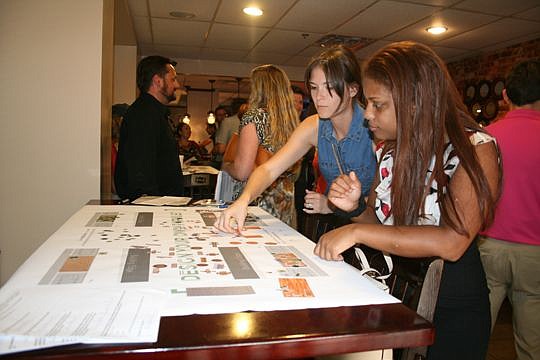
Business was especially brisk at lunchtime Thursday at the Zodiac Bar & Grill.
The Downtown restaurant’s kabobs, baba ghanoush and other Mediterranean fare weren’t the only reasons for the sprightly turnout, co-owner Jeriees Ewais said.
The quasi-temporary curb extension in front Zodiac may also have contributed to the cash register ringing up extra sales, he said.
For the day, Ewais moved the Zodiac’s umbrella-covered patio tables onto the teak wood tiling that covered the metered parking space in front of his West Adams Street business.
The “parklet,” as the tiny urban parks are known, was installed by Downtown Vision Inc. to demonstrate how niftily a parking space can be converted into a people space.
And it certainly created enthusiasm.
“I’m a big fan,” Ewais said. “There was a buzz out front today and I hope it catches on through the whole Downtown area.”
A work in progress, parklets could start popping up in Jacksonville as early as this winter.
Downtown Vision is implementing the project with Urban Land Institute North Florida, the Downtown Investment Authority and the city.
On Thursday, DVI and Windmill Consulting hosted a public meeting to generate interest in the parklet program, along with gathering input and providing information.
Dozens of people attended, including a handful who gathered on the temporary parklet as curious motorists and pedestrians passed by.
Mike Bolstra said he hadn’t planned to eat at Zodiac on Thursday, but did because of the buzz the parklet created as he drove by.
“I think it’s charming and kind of creates a hometown feel,” he said.
At the expense of a parking space or two at a time, parklets can liven up sidewalks, bolster business and provide parking for bicyclists, said Jennifer Hewett-Apperson, DVI’s district services director.
“Aside from being a business development tool, parklets are really a community development tool,” she said.
Jacksonville planners have reviewed parklet programs in San Francisco, where they were first popularized, and other communities.
At Thursday’s meeting, attendees had an opportunity to share how they think parklets should look by participating in a mock-up design exercise.
“Obviously you’re giving up a parking space and the question is, ‘Is it worth it?’ I think the answer is ‘yes’ in almost every case,” said Windmill’s Jack Shad, who formerly was the city’s parking director. “Downtown merchants are telling us that they think it’s a good trade-off.”
Windmill is developing a process for businesses, nonprofits and others with Downtown storefronts to obtain regulatory approval for installing parklets at an average cost of $10,000.
The consulting company’s work includes developing a manual that will provide a path for applicants to follow and covers such issues as right-of-way management, zoning, insurance and building code requirements.
The parklet program may be presented to the DIA for approval as soon as this summer.
“Parklets are a classic urban example of, if you build it, they will come,” Hewett-Apperson said.
Jacksonville real estate agent Grace Driscoll learned about the parklet program last week on the heels of touring Scandinavia, where walkability in urban areas is prevalent.
She said the information provided at Thursday’s meeting reinforced her notion that parklets would be a big step for Jacksonville.
“There’s a lot to learn from what other communities and other countries are doing to encourage public transportation and make Downtown areas more fun and vibrant,” she said. “Copenhagen, for example, was ridiculously easy to travel in.”
The bottom line, Driscoll said, is parklets are a smart use of space.
“Extending the sidewalk, which is what parklets effectively do, is the sort of urban design that I’d like to see Jacksonville doing,” she said.
The parklet project is being promoted by Transform Jax, which advocates for enhanced parks and public spaces, improved transportation and other Downtown improvements.
Mike Field, a co-founder of the organization, marveled Thursday as he stood outside Zodiac.
“Just look at the transformation that has occurred here today. If you’re passing by the Zodiac now, you see it as an exciting place — a place you want to be,” he said. “That’s because people attract people and people want to be around other people.”
While Ewais agrees parklets will enhance Downtown’s vibrancy and make it a better place to live, work and visit, he doesn’t know yet whether he’ll pay to put one in front of Zodiac.
“Ten thousand dollars is a big investment,” he said. “It is a business decision we will have to think about.”
Ewais said he thinks businesses’ alcohol sales permits may prohibit people from walking across the sidewalk with a beer or cocktail.
Still, he hopes other urban core businesses buy into the concept.
“It’s a cool look for Downtown,” he said.
Field said businesses are responding positively and the program is drawing minimal pushback. “Even the absence of negative responses has been positive,” he said.
Ultimately, the program’s success will depend on businesses that would pay to install, maintain and insure the parklets.
“That’s the biggest challenge. In the meantime, it’s just a matter of education and getting the word out,” Field said.